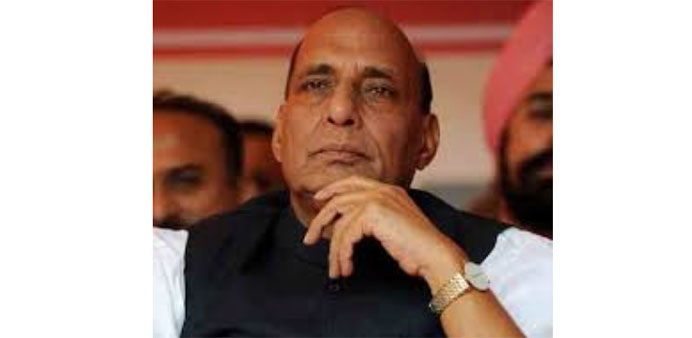Agencies/New Delhi
The head of the opposition Bharatiya Janata Party (BJP), tipped to win ongoing national elections, has ruled out any change in the country’s “no-first-use” nuclear weapons policy.
The BJP sparked speculation about an end to the doctrine last week when its manifesto said that the party would “revise and update” India’s policy.
“The no-first-use policy for nuclear weapons was a well thought out stand... We don’t intend to reverse it,” BJP president Rajnath Singh told the Hindustan Times newspaper in an interview published yesterday.
The policy was adopted after a series of nuclear tests in 1998 during the last BJP-led coalition government which led to international condemnation and an embargo being placed on the country by Western powers.
The policy was intended to gain India greater acceptability as a nuclear power, despite it not being a signatory of the 1970 UN Nuclear Nonproliferation Treaty which aims to prevent the spread of nuclear weapons.
The BJP is predicted to clinch power under elections which began on April 7 and end on May 12 with results on May 16.
Any BJP government under prime ministerial candidate Narendra Modi, a proud nationalist promising strong leadership, is expected to have a more muscular foreign policy.
Any change in nuclear policy would be of most significance to Pakistan and China.
Neither reacted to news of the possible review and analysts have pointed out that the “no-first-use” policy is a mere promise that could be ignored by New Delhi in a conflict situation.
China was the first country to adopt the “no-first-use” nuclear policy in 1964, but Pakistan, with whom India has fought three wars, does not have a similar position.
The BJP also said it would push on with the country’s drive to expand its grain exports if it forms the next government.
Since export restrictions were eased three years ago, India has emerged as the world’s top rice exporter and a key supplier of wheat to Southeast Asia and the Middle East.
Some grain traders had speculated that export policy could change if the BJP ousted the Congress Party-led government, but a senior BJP official sought to allay those concerns.
“We favour building the Indian grain brand globally and that would need consistency in export policy,” said Satpal Malik, the BJP vice-president in charge of drafting the farm policy section of the party’s manifesto.
The current Congress-led government has conducted extensive purchases of wheat to support farmers, typically taking 25-30mn tonnes per year - or around a third of the annual crop.
But with the floor of $260 per tonne for government buying below the price Indian wheat can now fetch on international markets, exports have been profitable for state-run traders.
In a tender last Friday, Indian state traders fetched prices of as much as $285 per tonne for shipments to be made in May.
Although a defeat for the current government would bring shifts in an array of policies ranging from national security to the sale of state businesses, grain exports would be an area of continuity.
“It’s ridiculous to think that every policy of the previous regime would be reversed after we come to power,” said Malik, a former government minister.
Repeated bumper harvests due to ample monsoon rains have led grain stocks to pile up. At the start of the new fiscal year on April 1, rice and wheat stocks were 38mn tonnes, more than double the target of 16mn tonnes.
Malik said keeping the export window open would ensure better prices for local growers and, helping cut the fiscal burden of Rs1.15tn ($19bn) arising from food subsidies.
The BJP plans to roll out a programme to boost farm efficiency that Modi has championed in his home state of Gujarat. The system involves issuing cards to farmers recording soil properties such as productivity, mineral mix, water capacity and salinity.

